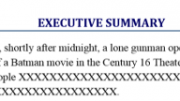By Jeffrey A. Roberts
CFOIC Executive Director
The point of Rule of Criminal Procedure 55.1, adopted by the Colorado Supreme Court in late 2020, is to shine light on why trial court judges sometimes decide the public shouldn’t see records on file in criminal cases. It was meant to solve the problem of criminal court records “just disappearing into a black hole,” then-Chief Justice Nathan Coats told the legislature’s Joint Budget Committee last December.
The rule has been in effect since May 10, so it was surprising to see a judge last weekend issue a one-word order temporarily sealing all documents in a felony menacing case against Fifth Judicial District Court Judge Mark Thompson. “GRANTED” is all Judge Paul Dunkelman wrote. His order did not contain any of the specific findings required by Rule 55.1, nor did it set a date certain for terminating the order.

Heidi McCollum, district attorney for the Fifth Judicial District, had asked for the secrecy, noting in a motion that Thompson “is a prominent member of the Summit County community” and arguing that the release of the court records “could jeopardize the on-going investigation and/or interfere with the rights of the defendant, including irreversible harm to reputation” and his right to a fair trial. The motion made no reference to Rule 55.1, nor did it address whether “less restrictive means,” such as redaction, could protect those interests.
A different judge has since ordered the complaint against Thompson released to the public, with some redactions.
Even so, “this new rule has to be enforced,” said Steve Zansberg, a media attorney and president of the Colorado Freedom of Information Coalition. “The rule matters and it has to be abided by attorneys and judges who are subject to the rule. It allows the clerk to temporarily suppress a court record pending a judicial ruling on a motion to suppress and do so without making any findings. A judge cannot do so. This judge’s order violated the rule.”
It was Zansberg who, in 2016, urged the state judicial branch’s Rules of Criminal Procedure Committee to consider a uniform standard for sealing and suppressing criminal court records, noting that the lack of a statewide rule forced each trial court judge to determine the legal principle to apply whenever there are disputes over public access.
The committee at first rejected his proposal as unnecessary, but reconsidered after The Denver Post in 2018 published a series showing that more than 6,000 court cases had been hidden from public view because of judges’ orders to suppress them, often with no ruling to explain their reasoning. Also that year, The Colorado Independent argued that a district court judge did not sufficiently explain why he sealed records alleging misconduct in the prosecution of a killer who ended up on death row. In that case, the Colorado Supreme Court declined to recognize a constitutionally based presumption of public access to judicial records.
Under Rule 55.1, “court records in criminal cases are presumed to be accessible to the public.” Upon receiving a motion to seal or suppress, like the one filed by McCollum, a court clerk “shall” make a record inaccessible to the public, pending the court’s resolution of the motion, allowing any party 14 days to file an objection.
A judge who grants a motion under Rule 55.1 seeking to suppress “any part” of a criminal court record must explain his or her reasoning in a document available to the public. The written order must specifically identify one or more “substantial interests served by making the court record inaccessible to the public or by allowing only a redacted copy of it to be accessible to the public.” The judge must find that those substantial interests override “the presumptive public interest” in disclosing the records and that “no less restrictive means” exist to protect those interests.
Additionally, any court order limiting public access must specify “a date or event certain by which the order will expire.”
Dunkelman’s order neither specified an end date nor explained his reasoning, Zansberg noted. The judge just ordered the records sealed.
“The Colorado Supreme Court spent months working this rule out. It heard testimony and revised it and promulgated this rule,” he said. “We expect attorneys appearing in criminal cases and judges to read these rules and take them seriously and abide by them.”
Asked why it appears Dunkelman did not follow Rule 55.1, Colorado Judicial Department public information officer Rob McCallum replied to CFOIC: “As you are seeking comment about a ruling involving an open case, we respectfully decline.”
The court documents made public Wednesday by District Court Judge Sean Finn show that Thompson is accused of using an “AR-15 style rifle” to threaten someone on July 25. The name of the alleged victim was redacted, and the documents do not include any other details about the incident.
McCallum told the Summit Daily News the information provided in the criminal complaint was normal for a summons and, because Thompson was not arrested, there is no affidavit of probable cause that typically would provide more details.
McCollum, the DA, told The Denver Post she asked that the records be sealed to let special prosecutors handle the case however they choose. “There’s nothing in that intended to be secret or nefarious or hiding anything,” she said.
The sealing of records in the Thompson case garnered national attention.
Follow the Colorado Freedom of Information Coalition on Twitter @CoFOIC. Like CFOIC’s Facebook page. Do you appreciate the information and resources provided by CFOIC? Please consider making a tax-deductible donation.




